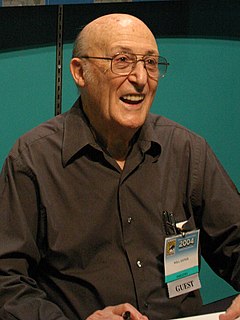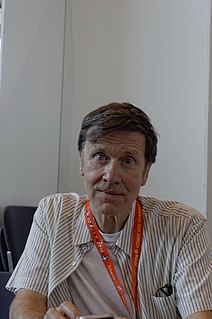A Quote by Will Eisner
Comics, which are really best described as an arrangement of images in a sequence that tell a story - an idea - is a very old form of graphic communication. It began with the hieroglyphics in Egypt, it first appeared in a recognizable form in the Medieval times as copper plates produced by the Catholic church to tell morality stories.
Related Quotes
If you start with the idea that you are going to be writing about a night in a graveyard, and that there are only a few living people in that frame, all sorts of interesting and difficult technical problems arise. And then form - new form, or experimental form - might be understood as just trying to tell that story most movingly and efficiently.
Larry and I, and a bunch of our colleagues, were sitting on great stories that needed to get out to an audience in one way, shape or form. We've both produced comics in the past, and audio dramas seemed like a similarly interesting option, the other side of the coin. As we've continued with the project, the format has become a vital way for us to tell our stories.
Comics are a "young" art form, and there is much confusion as to how to treat them. Images have more immediate impact than words, and it is not every reader who can be convinced to relax into experiencing the work for what it is - not words and pictures, but a different form, where the narrative is propelled by the blending of image, word and sequence, and where no element can be extricated and have the same meaning by itself. When this art is shown in a gallery, its "thingness" is called to attention, it is no longer experienced as "story," but rather as an artifact of the artist's process.
The graphic novel? I love comics and so, yes. I don't think we talked about that. We weren't influenced necessarily by graphic novels but we certainly, once the screenplay was done, we talked about the idea that you could continue, you could tell back story, you could do things in sort of a graphic novel world just because we kind of like that world.
The very act of story-telling, of arranging memory and invention according to the structure of the narrative, is by definition holy. We tell stories because we can't help it. We tell stories because we love to entertain and hope to edify. We tell stories because they fill the silence death imposes. We tell stories because they save us.
I'm always looking for context in which people tell stories. In "Fight Club" it's these support groups for dying people, and then in "Choke" it's 12-step recovery groups. In one novel it's artists' colonies, in another novel it's a diary form that submariners' wives typically keep so that when their husband comes back from serving on a submarine they have an accounting of their spouse's time. So I'm always looking for, number one, a non-fiction context - because you can tell a more outrageous story if you use a non-fiction form.
The best time to tell your story is when you have to tell your story. When it's not really a choice. But then, when you get that first, messy, complicated version down, you have to read it over and be very tough on yourself and ask, 'Well what's the story here?' If you're lucky enough to have someone you trust looking over your shoulder, he or she can help you if [you] lack perspective on your own story.
Now I'm in nonfiction. To me any given story has its appropriate form. There might be some story I get involved with that's begging to be a graphic novel, so that will have to be that way. There's always that matching of the content and the form, and that means everything to me. I spend years thinking about what that match is going to be before I can really make it work.
I'm very grateful to be in a position now where I have a lot more control to tell the stories I want to tell. I feel no obligation to tell any one story. I will tell you my interest mostly lies in telling stories about empowered women, but I don't feel it's an obligation. But I do feel like I am servicing a voice.


































